Are you looking to secure funding for your investigative report but unsure how to craft your request? Writing a compelling letter can make all the difference, as it sets the tone for your project's credibility and importance. In this article, we will explore essential elements to include in your funding request, ensuring it speaks to the hearts and minds of potential sponsors. Join us as we delve into practical tips that can help you effectively communicate your investigative vision!
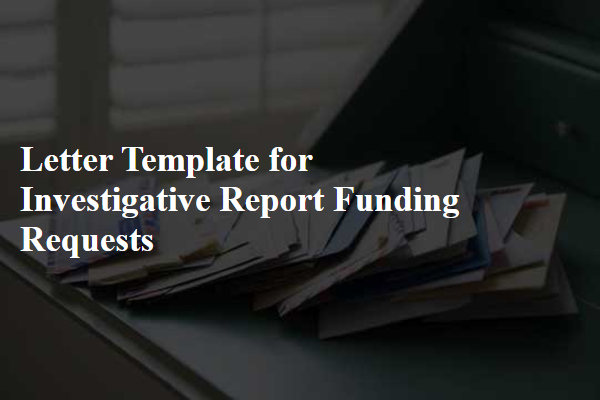
Clear project description
A comprehensive project description for investigative report funding requests should clearly outline the primary objectives and scope of the investigation, detailing the specific issues or phenomena being addressed. This encompasses identifying the central problem, providing contextual background--such as significant events, historical data, or relevant demographics. For example, if researching water contamination in Flint, Michigan, include statistics on lead levels exceeding the EPA's action limit of 15 parts per billion, impacted populations, and prior environmental studies. Emphasize the methodology, including qualitative interviews or data analysis techniques, to ensure transparency and rigor. Incorporating anticipated outcomes, potential policy implications, or public benefits reinforces the project's relevance and urgency, enhancing the overall clarity and persuasiveness of the request for funding.
Detailed budget breakdown
An investigative report seeks funding to cover essential costs associated with data collection, analysis, and dissemination. The detailed budget breakdown includes personnel expenses for skilled investigators and analysts who possess expertise in fields such as journalism, data science, and legal analysis. Tool costs include subscriptions to databases, software licenses for data visualization tools, and licenses for access to specialized research archives. Travel expenses encompass transportation (airfare, local transport), accommodation, and meals for fieldwork in significant locations, such as urban centers or specific regions related to the investigation. Additional budget items cover materials for reporting, such as printing and online distribution of findings. Lastly, contingency funds provide financial flexibility for unexpected expenses, ensuring the thoroughness and accuracy of the investigative process.
Significance and impact
Investigative reports serve as essential tools for uncovering the truth behind critical issues affecting various sectors, such as politics, environmental concerns, and public safety. Well-funded investigative projects can illuminate significant events, with powerful stories that can engage and inform audiences, leading to public discourse and potential policy changes. The impact of a well-researched report can resonate far beyond publication, influencing legislation (such as the Whistleblower Protection Act or similar laws) and sparking social movements focused on accountability and transparency. Documented findings can result in legal actions against corporate or governmental misconduct, ultimately benefiting communities and advocating for justice. Successful ventures require financial support for comprehensive research activities, investigative journalism training, and production costs, ensuring thorough exploration of complex issues. Each funding request directly contributes to empowering investigative work that holds powerful entities accountable and fosters a more informed society.
Evaluation and assessment plan
Investigative report funding requests require a robust evaluation and assessment plan to ensure thorough analysis and transparency. The evaluation framework encompasses defined objectives, methodological approaches, and measurable outcomes related to the investigative goals, such as financial misconduct and resource misallocation. Key performance indicators (KPIs) may include the accuracy of data collected from interviews, documents reviewed, and correlations identified. Funding requests typically highlight the importance of an independent review board to oversee the assessment process, ensuring credibility and accountability, particularly in sensitive areas such as whistleblower protections. Timeline frameworks, expected deliverables, and anticipated challenges reinforce the necessity of adequate resources for successful completion. Allocation of funds must emphasize crucial stages, including preliminary research, evidence gathering in field investigations, and final reporting. The plan ultimately serves to validate the investigative process while adhering to ethical standards and maximizing stakeholder engagement throughout.
Credentials and expertise of team
The investigative team comprises seasoned professionals with extensive backgrounds in forensic analysis, journalism, and data science. The lead investigator, with over 15 years of experience in high-profile criminal investigations, has previously worked with law enforcement agencies such as the FBI and local police departments. The data analyst, skilled in statistical methodologies, holds a Master's degree in Data Science from Stanford University, employing analytical tools like Python and R to uncover trends and patterns in large datasets. A seasoned journalist, with a track record of award-winning investigative reporting for renowned publications like The New York Times, ensures the team's findings are documented with clarity and accuracy. The legal advisor, a former prosecutor with a Juris Doctor from Harvard Law School, provides essential legal insights, ensuring compliance with regulations and ethical standards throughout the investigative process. Together, this team of experts will leverage their combined knowledge and skills to conduct a thorough and credible investigation.
Letter Template For Investigative Report Funding Requests Samples
Letter template of funding request for investigative report on community welfare.
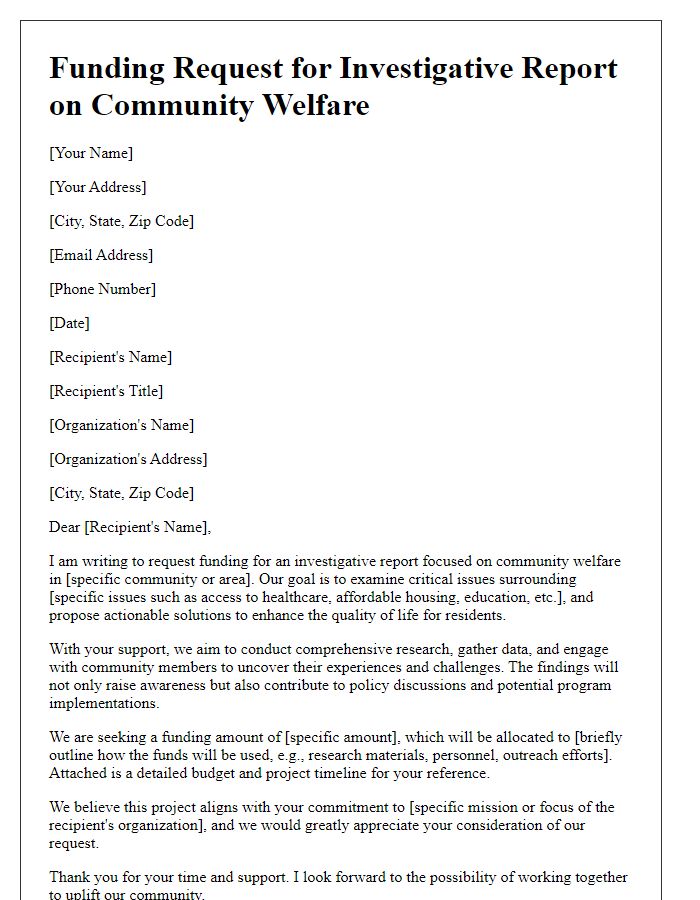
Letter template of funding request for investigative report on environmental issues.
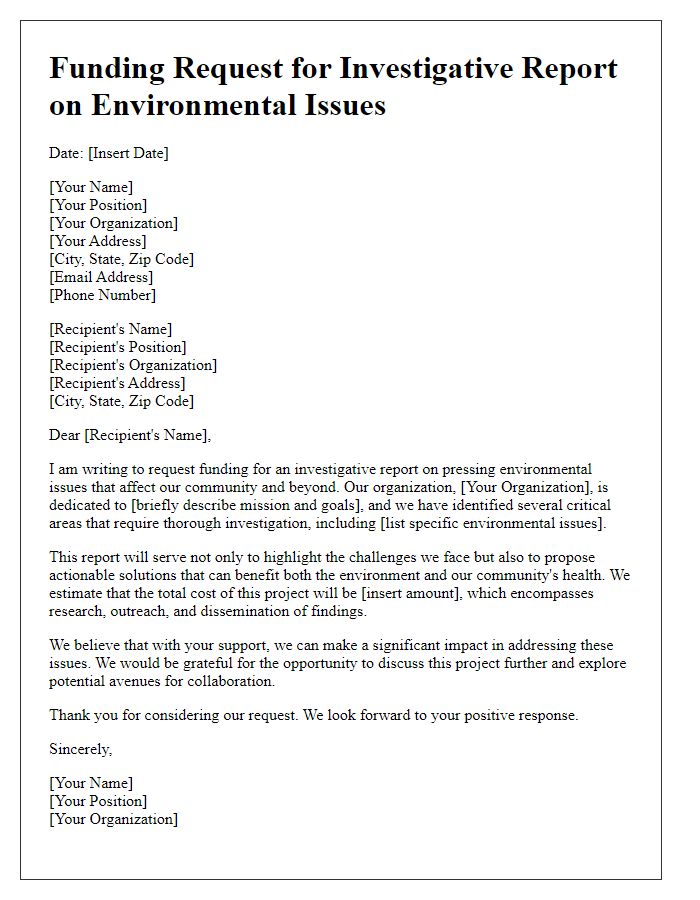
Letter template of funding request for investigative report on public health.

Letter template of funding request for investigative report on educational disparities.
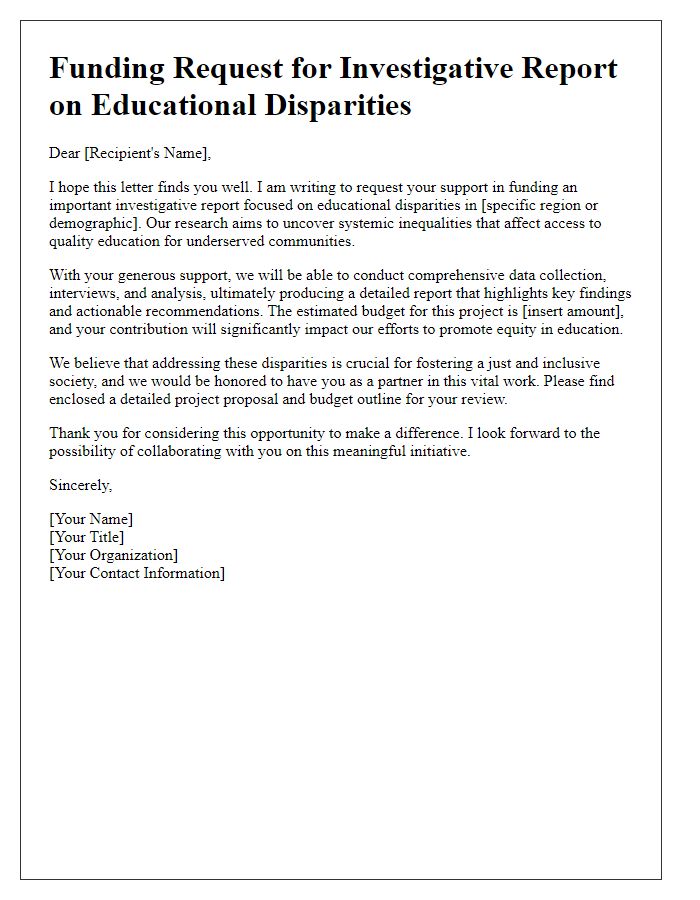
Letter template of funding request for investigative report on economic development.
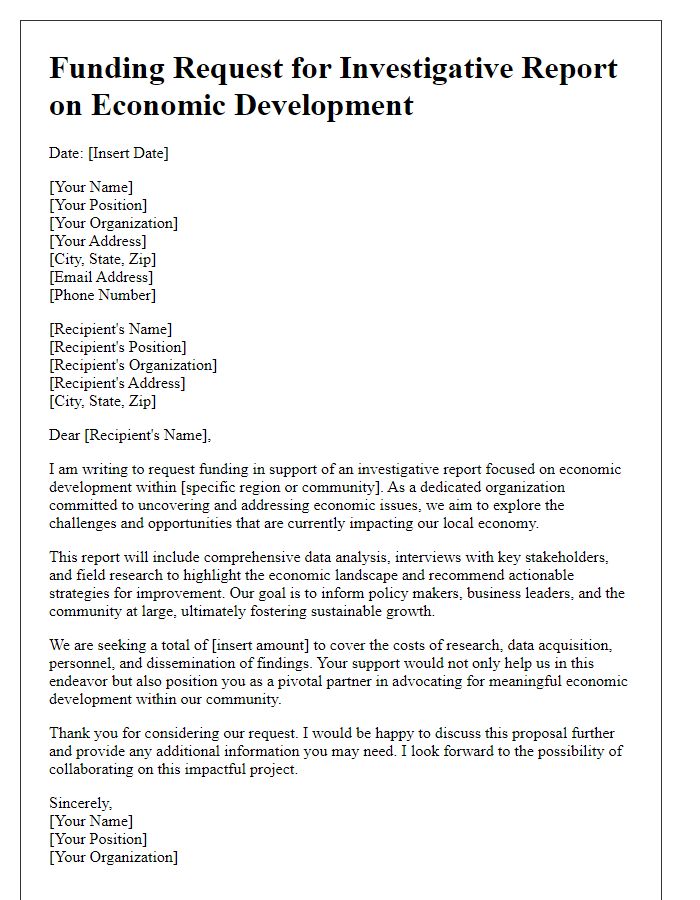
Letter template of funding request for investigative report on social justice initiatives.
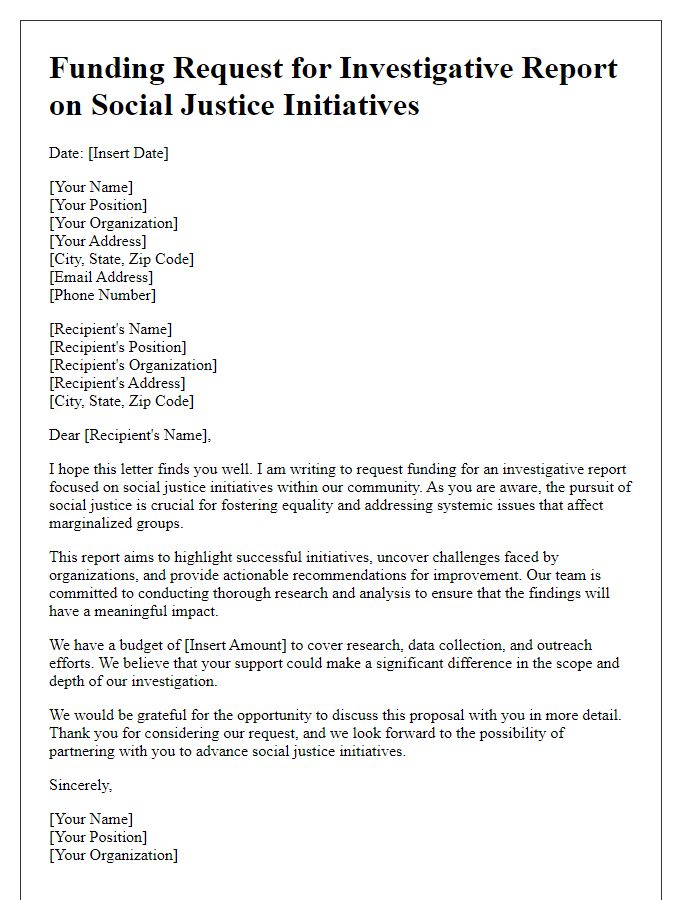
Letter template of funding request for investigative report on corporate accountability.
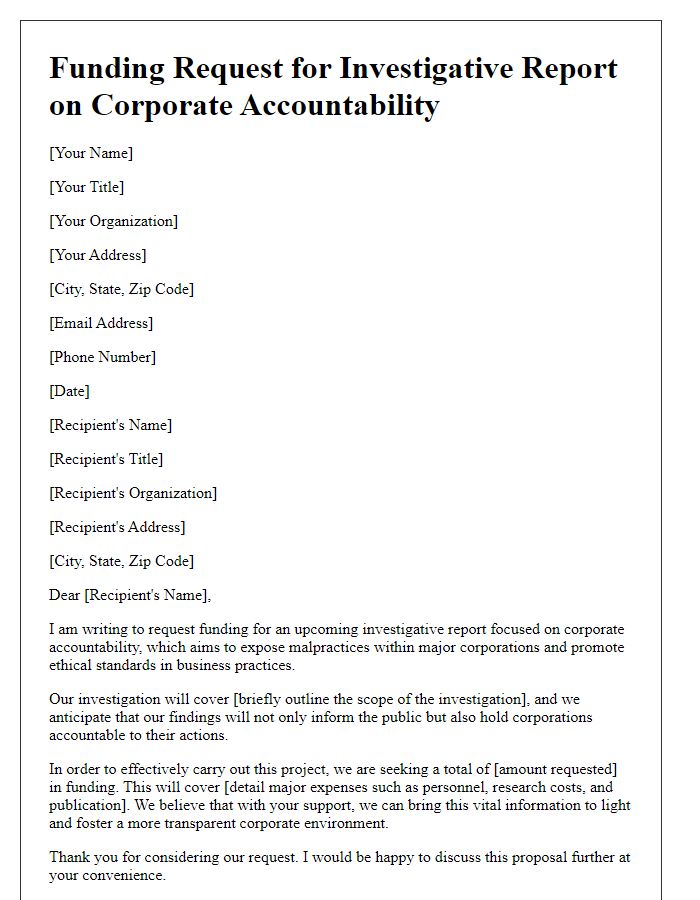
Letter template of funding request for investigative report on government transparency.
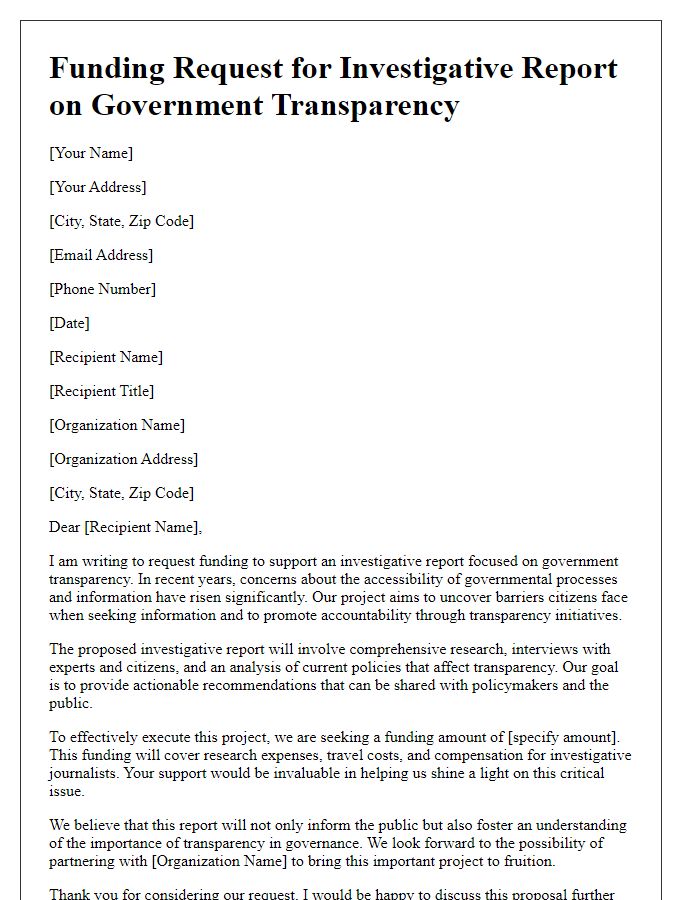
Letter template of funding request for investigative report on consumer protection.
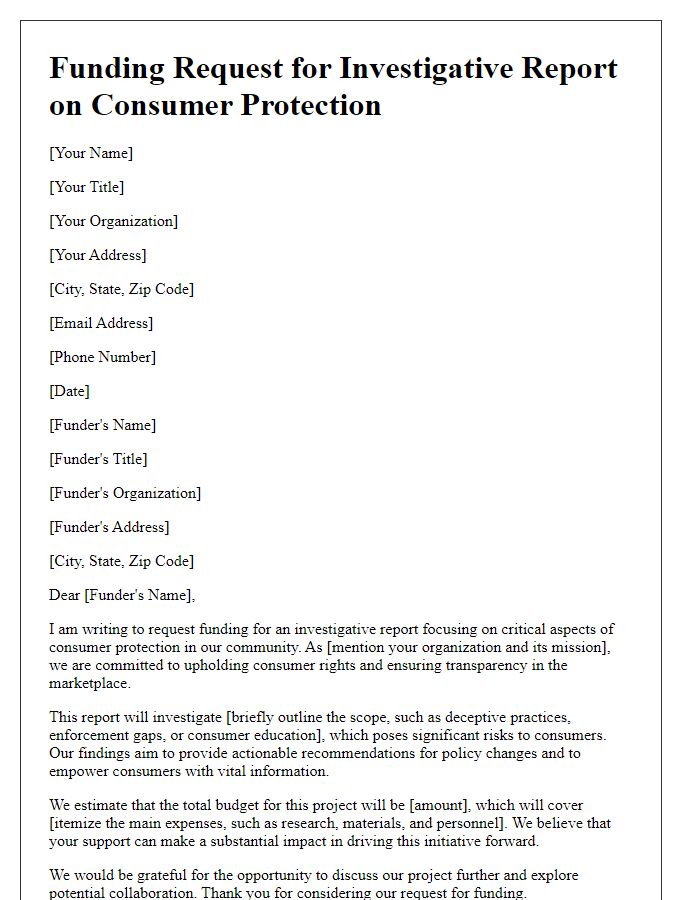

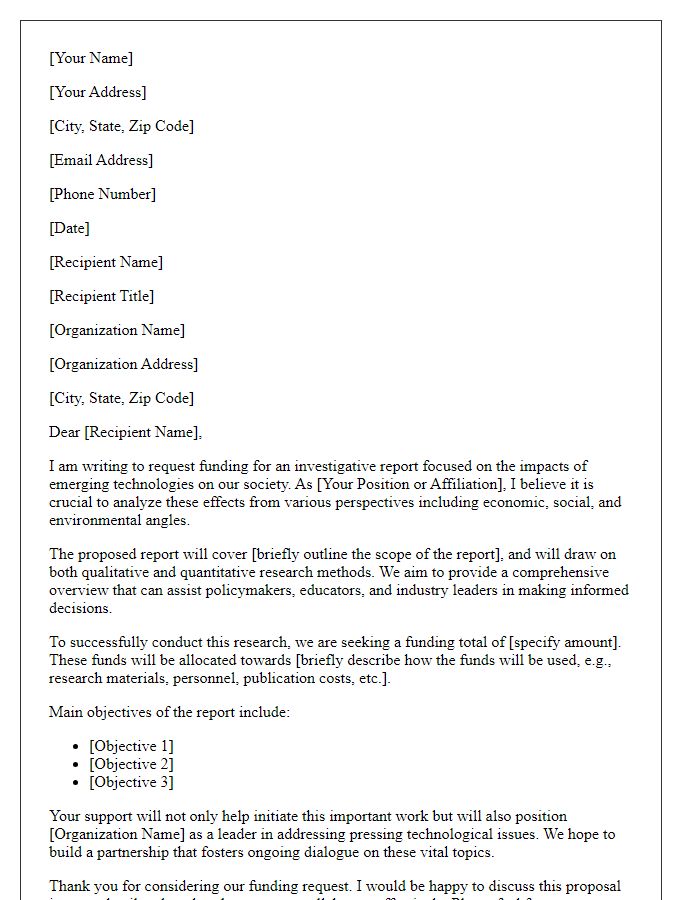

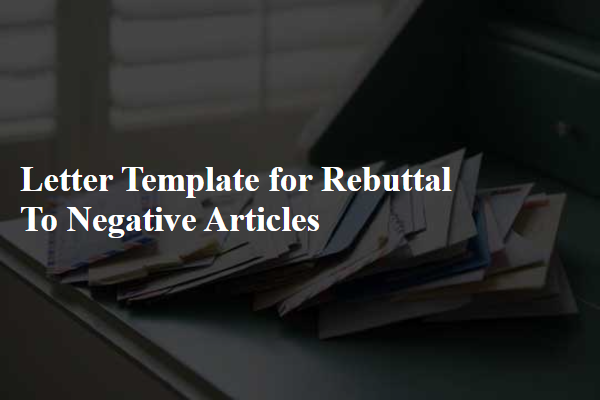
Comments